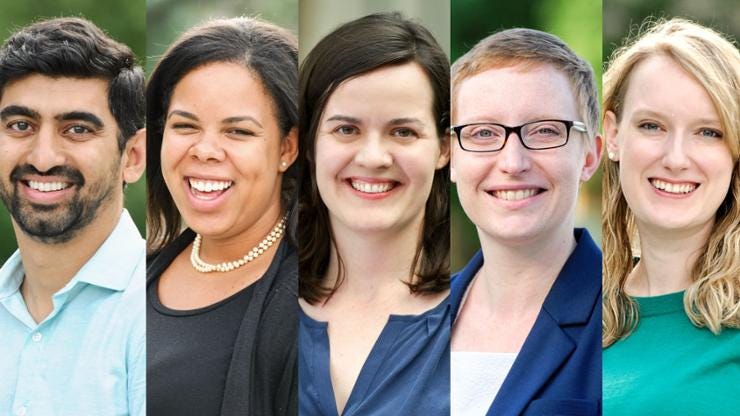
Tenure has been granted to Professors Bejjanki, Jumet, Moore, Mouflard and White. Photo courtesy of Hamilton College.
arch 5, the Board of Trustees granted tenure to five professors: Vikranth Bejjanki (Psychology and Neuroscience), Kira Jumet (Government), Celeste Day Moore (History), Claire Mouflard (French and Francophone studies) and Rachel White (Psychology).
The process of recieving tenure is a lengthy one, which on average lasts over eight years. Dean of Faculty Suzanne Keen explained that it starts with the Allocation Process, during which the heads of various departments write an “Allocation request” to the Committee on Academic Policy (CAP).
An academic department, or group of professors spearheading a new program, will try to get the CAP’s approval for adding a new tenure-track position.
However, due to budgetary reasons and an overall restriction on the number of available positions, only four to five allocation requests are typically approved per year.
However, Keen noted that due to a variety of reasons, such as an overall increase in incoming class numbers and the subsequent demand for new professors, the CAP approved 14 new tenure-track positions this year. It reviews all requests during the year before submitting their recommendations to the Dean of Faculty, who then reviews and recommends the changes to the College’s President.
Departments that have been approved for a new tenure-track position start a year-long search for candidates who have completed a terminal degree in their field, such as a Ph.D. Once hired, the newly appointed tenure-track faculty start a roughly six-year process at Hamilton where they build a portfolio for their tenure appointment. This is, however, not a hard set rule. Depending on any number of circumstances, the tenure-track faculty may take or request an extension for their track. “For example, a tenure-track archaeology faculty member was approved for an extension during COVID as they were unable to go to their dig,” Dean Suzanne Keen recalls.
The Committee on Appointment (COA) oversees approvals when a tenure-track professor comes up for their tenure.
When considering a faculty member for tenure, the College looks at three factors: their teaching, scholarship and their service, with emphasis on the first two factors. Consistent with the 2019 Faculty Handbook, candidates for promotion are “expected to provide distinction to the Faculty as teachers, to have demonstrated sound, continuing growth as scholars, and to serve as leaders of the academic community.”
The tenure candidate’s portfolio goes through every step of the process. The department reviews the portfolio and votes on it before sending it to the COA, who then reviews and votes on it before sending it to the Dean, then the President. Lastly, the Board of Trustees speaks with students and makes the final verdict.
When there is a disagreement at any point during the “multi-layered judgment,” the portfolio is halted and a meeting is held to reconcile the dispute. To ensure that no single person is controlling the process, the Board of Trustees makes all final decisions. However, Dean Suzanne Keen says that “by the time it reaches the Trustees, it should already be a very strong case.”